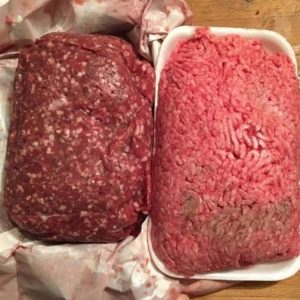When choosing between store-bought and farm-raised beef, the decision involves much more than flavor and tenderness. It touches upon your health, ethical beliefs, and environmental concerns, making it a multifaceted choice. This article delves into the differences between these two types of beef, helping you make a more informed and conscious decision for both yourself and the planet.
Store-Bought Beef: Convenience vs. Chemicals
Store-bought beef is commonly sourced from industrial farming operations, where mass production and cost-efficiency are prioritized. One of the most noticeable characteristics of store-bought beef is its light, pinkish hue. However, this color is often not a natural feature of the meat. In fact, it’s a result of preservatives and additives such as propyl gallate, which are commonly used to extend the shelf life of the meat and enhance its visual appeal on store shelves.
While these chemicals are effective in preserving the meat’s freshness, they come at a potential cost to your health. Studies have raised concerns about the long-term effects of consuming meat treated with additives and preservatives, especially when consumed in large quantities over time. Additionally, the beef from large-scale, factory-style farms is often subjected to artificial growth hormones and antibiotics to promote faster growth and prevent disease, which can lead to residues in the final product that make their way into our bodies.
From an ethical standpoint, factory farming has come under increasing scrutiny. The conditions in which animals are raised on large-scale farms are typically far from ideal. Livestock are often confined to cramped, unsanitary spaces with limited access to natural environments, leading to concerns about animal welfare. Moreover, the environmental impact of such practices is considerable, with factory farming contributing significantly to greenhouse gas emissions, water pollution, and deforestation due to the vast land required for cattle feed production.
Farm-Raised Beef: Healthier and More Sustainable?
Farm-raised beef, particularly from local or grass-fed operations, offers a stark contrast to the industrial beef industry in several key areas. Beef from farm-raised cattle is typically free from the preservatives and additives used in mass-produced beef, resulting in a more natural product. Grass-fed cows, for example, tend to produce beef that is leaner and higher in beneficial nutrients such as omega-3 fatty acids and antioxidants, which are important for heart health and overall well-being.
In addition to the health benefits, farm-raised beef is often considered more humane. Smaller, local farms tend to prioritize animal welfare, allowing cattle to roam freely in pastures and providing them with a more natural, less stressful environment compared to factory farming. These farms typically use sustainable practices, focusing on rotational grazing and minimizing the use of harmful chemicals or growth hormones. The result is not only better quality meat but also a more ethical approach to farming.
Farm-raised beef is also seen as more environmentally friendly than store-bought alternatives. By supporting local, sustainable farms, consumers can reduce their carbon footprint, as the transportation costs associated with getting meat to market are significantly lower. Additionally, grass-fed cattle are often better for the environment because they contribute less to soil erosion and help improve soil health through natural grazing practices.
Making the Right Choice for You
The decision between store-bought and farm-raised beef ultimately depends on your values, health priorities, and budget. Store-bought beef might be more affordable and convenient, but it comes with a set of trade-offs regarding health, ethics, and the environment. On the other hand, farm-raised beef—particularly from sustainable, grass-fed farms—may be more expensive but offers a range of health benefits, better animal welfare practices, and a lower environmental impact.
If health and ethics are important to you, choosing farm-raised beef may be the best option. While it may require a bit more research and potentially higher cost, you can feel good knowing that you are making a more conscious choice for your body and the planet. For those on a budget, however, it’s still possible to make healthier choices by looking for beef from farms that follow more ethical practices, even within the confines of mass production.
By considering these key factors—health, ethics, and environmental impact—you can make a more informed decision about which beef to buy. Whether you prioritize flavor, sustainability, or animal welfare, understanding the differences between store-bought and farm-raised beef will allow you to choose the product that best aligns with your values.
